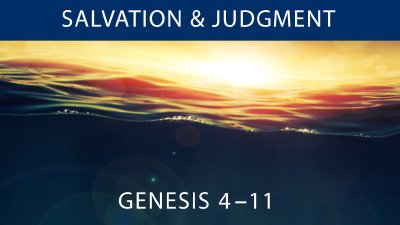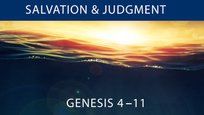

Genesis 4-11: Salvation & Judgment
Sermon Series
Or Giants: Enlarging Our Vision of God's World, God's Son, and God's Salvation (Gen. 6:1-8)
May 5, 2024 • David Schrock • Genesis 6:1–8
Dear OBC Family, On Sunday, we take the first step toward understanding the history of the flood—its causes, its characters, and its covenant. In particular, we will spend time looking at the strange statements found in Genesis 6:1–4. Who were the sons of God? Who were the daughters of man? Who were the Nephilim? How do they relate to one another? And how do they relate to us today? Those questions require care and attention, and we should pray for wisdom as we come to worship on Sunday. Indeed, it is easy to gloss over these verses as strange relics of a by-gone era, but as we will see there are important aspects of this story that we need to know. To prepare for Sunday, take time to read Genesis 6. You may also find help reading 2 Peter 2 and Jude. These two books look back at Genesis 6 and help us better understand how to read the Old Testament. Additionally, if you are interested in thinking more about how the New Testament reads the Old and how we should engage with extra-biblical passages, you may find https://na01.safelinks.protection.outlook.com/?url=https%3a%2f%2fobc.us14.list-manage.com%2ftrack%2fclick%3fu%3ddd23918991ea6f542a8065bed%26id%3d481516a089%26e%3df5b57025e0&data=05%7c02%7c%7cf53fd654f6b44e3c9ecf08dc6bb1cd78%7c84df9e7fe9f640afb435aaaaaaaaaaaa%7c1%7c0%7c638503658617581291%7cunknown%7ctwfpbgzsb3d8eyjwijoimc4wljawmdailcjqijoiv2lumziilcjbtii6ik1hawwilcjxvci6mn0%3d%7c0%7c%7c%7c&sdata=t1eafbqslea%2bhokbnyjbcchqgucjgrar1pxeytuxtwy%3d&reserved=0. For all of us, let us pray that the Lord who rules over all creation will pour out his mercy upon us as we gather in his name on Sunday. I look forward to seeing you there, as the Lord allows. For His Glory and your joy in Christ, Pastor David -------------------------------------------------------------------------------------------- Discussion & Response Questions (Genesis 6:1-8) What questions do you have after reading this text? The following questions are largely related to the “sons of God” and giants: What are the predominant views of the identity of the “sons of God”? How does the Old Testament use this phrase? (Consider who is in view in Deuteronomy 32:8; Job 1:6; Job 2:1; Job 38:7). As we look to Scripture to interpret Scripture, how does Jude 1:5-7 compare angels that sinned with Sodom and Gomorrah? What does Mark 12:25 teach us about angels and the saints in heaven? How does this apply (or nor apply) to Genesis 6? What giants do you see in Scripture? Consider the Nephilim (Genesis 6:4; Numbers 13:33) and the “sons of Anak” (Deuteronomy 1:28; 2:10; 9:2; Joshua 14:12-15; 15:13), and the Rephaim or Emim (Deuteronomy 3:11-13). Consider also Goliath (1 Samuel 17), his relatives, and their descendants (1 Chron 20:4-6; 2 Samuel 21:5-17). What repeated themes do you see? What do you find challenging about these texts, and why? As we read Genesis 6:1-8, what are the ways in which we observe God’s judgment? Looking at the text, what provokes these judgments? How do these judgements change humanity? What characterizes man’s heart, and why? What is the Bible’s consistent message when it comes to mankind’s condition? How should we understand the language of God seeing (Gen 6:5) and having regret (Gen 6:6)? How do we rightly interpret this text without denying the omniscience (Ps 139; Heb 4:12-13; 1 John 3:20) and immutability of God (Num 23:19; Mal 3:6; James 1:17)? How is Noah distinct from the rest of mankind? How can one find favor with God? Consider Noah (Heb 11:7; 2 Pet 2:5). What does this passage teach about God’s world? God’s son? Our salvation? What questions are left unresolved?
The True and Better Enoch: Moving from the Genealogy of Adam to the Genealogy of Jesus (Gen. 5:1-32)
April 28, 2024 • David Schrock • Genesis 5
On Sunday, we return to our study of Genesis. And for those who have been waiting to hear about the Nephilim in Genesis 6, you’ll have to wait one more week. For this Sunday, we have a genealogy to journey. And I say journey, because the names and events related to this list of figures is anything but boring. Indeed, from Seth to Enoch to Noah, we will see an important history that connects Adam to his faithful sons, on the way to a story of giants being destroyed by a global flood. That’s next week (see more below). As we saw three Sunday’s ago, the sons of Cain pursued all manner of wickedness in Genesis 4. But now, as the sons of Seth begin to call upon the name of the Lord, there is great hope that those who die in faith will be received by the Lord. Or at least, that is the situation for one man by the name of Enoch. Among the fathers named in Genesis 5, Enoch stands out as a turning point in the story. And more his ascension to heaven, as I will argue, promises mankind that death is not the only option. Instead, there is way of life that comes by walking with God. Yet, walking with God requires more than a daily quiet time, it requires spiritual warfare. For, as we will see, the generations before Noah are wicked and rebellious, much like our own generation. And thus, from the fighting faith of these fathers, we will see what it looks like to trust God amidst a generation who doesn’t. To prepare for Sunday, read Genesis 5. But don’t stop there. You will also be helped by reading Jude and Matthew 1. And for the more studious, you would be helped by reading https://na01.safelinks.protection.outlook.com/?url=https%3a%2f%2fobc.us14.list-manage.com%2ftrack%2fclick%3fu%3ddd23918991ea6f542a8065bed%26id%3d306ae844d0%26e%3df5b57025e0&data=05%7c02%7c%7c7de00d41c9e840addee408dc662f8f00%7c84df9e7fe9f640afb435aaaaaaaaaaaa%7c1%7c0%7c638497601667040939%7cunknown%7ctwfpbgzsb3d8eyjwijoimc4wljawmdailcjqijoiv2lumziilcjbtii6ik1hawwilcjxvci6mn0%3d%7c0%7c%7c%7c&sdata=gliu5cixy3wfzixdaoncdgjl%2bhkr%2briayzbfdliqf%2bq%3d&reserved=0. As I mentioned three weeks ago, this passage is not found in the biblical canon, and I don’t treat it as inspired by God and authoritative for doctrine. Nevertheless, this book clearly contributed to the worldview of the Jews in Jesus' day and was quoted by Jude (1 Enoch 1:9 = Jude 14–15). So knowing its contents will help you better understand Genesis 5:1–6:8, as well as the message of Christ’s conquest over the powers and principalities. Furthermore, as we prepare to tackle giants next week, you might be helped by picking up a copy of https://na01.safelinks.protection.outlook.com/?url=https%3a%2f%2fobc.us14.list-manage.com%2ftrack%2fclick%3fu%3ddd23918991ea6f542a8065bed%26id%3d551d2b173e%26e%3df5b57025e0&data=05%7c02%7c%7c7de00d41c9e840addee408dc662f8f00%7c84df9e7fe9f640afb435aaaaaaaaaaaa%7c1%7c0%7c638497601667054738%7cunknown%7ctwfpbgzsb3d8eyjwijoimc4wljawmdailcjqijoiv2lumziilcjbtii6ik1hawwilcjxvci6mn0%3d%7c0%7c%7c%7c&sdata=vz3ssqvbh0d%2beldluw4gvrqu98nhyeye6vieadpy1ty%3d&reserved=0 from the bookshelf. Or you can listen to Haunted Cosmos on Giants (https://na01.safelinks.protection.outlook.com/?url=https%3a%2f%2fobc.us14.list-manage.com%2ftrack%2fclick%3fu%3ddd23918991ea6f542a8065bed%26id%3d60fd007d39%26e%3df5b57025e0&data=05%7c02%7c%7c7de00d41c9e840addee408dc662f8f00%7c84df9e7fe9f640afb435aaaaaaaaaaaa%7c1%7c0%7c638497601667059346%7cunknown%7ctwfpbgzsb3d8eyjwijoimc4wljawmdailcjqijoiv2lumziilcjbtii6ik1hawwilcjxvci6mn0%3d%7c0%7c%7c%7c&sdata=gqxdbkq35ld2%2bmram41i0wtpqab4c%2fpb8jfgvirhlpw%3d&reserved=0, https://na01.safelinks.protection.outlook.com/?url=https%3a%2f%2fobc.us14.list-manage.com%2ftrack%2fclick%3fu%3ddd23918991ea6f542a8065bed%26id%3d7c26962861%26e%3df5b57025e0&data=05%7c02%7c%7c7de00d41c9e840addee408dc662f8f00%7c84df9e7fe9f640afb435aaaaaaaaaaaa%7c1%7c0%7c638497601667063631%7cunknown%7ctwfpbgzsb3d8eyjwijoimc4wljawmdailcjqijoiv2lumziilcjbtii6ik1hawwilcjxvci6mn0%3d%7c0%7c%7c%7c&sdata=7rug%2fvbyqvnq5mrpwioknpjwac%2b%2fkve%2f%2f3sb2ztomha%3d&reserved=0). Next week is going to be gigantic . . . and not just because of the Nephilim. This week and next we will see more clearly how great our risen Christ is! And so, I look forward to seeing you on Sunday as we come and worship our king, the one who reigns over all things in creation—things visible and things invisible too! For His Glory and your joy in Christ, Pastor David ----------------------------------------------------------------------------------------------------------- Discussion & Response Questions (Genesis 5) When you read a genealogy in the Bible, what are you looking for? What are they used for? And how can you over-read them? Or under-read them? What comes before the genealogy in Genesis 5 and what comes after? How does the genealogy help us understand both sections? And vice versa? There are four key figures in the genealogy (Adam, Enoch, Lamech, Noah). What does the passage tell us about each? How does these vignettes add to our understanding of the passage? There are also minor figures (Seth, Jared, Methuselah). What do we know about them? What role do the names of these men play? What is the recurring theme in Genesis 5? What does death teach about God and his world? And how does the theme of death highlight Enoch’s ascension? What is the relationship between the sons of Cain (Gen 4:17–24) and the sons of Seth (Gen. 5)? Look especially at the seventh generation. Cf. Jude 14–15. What connections does Genesis 5 have with the New Testament? Cf. Matthew 1:1–17; Hebrews 11:1–7; Jude 14–15. What do these connections tell us? What does it mean that Christ is a new Enoch? What other questions do you have? Are you ready to talk about giants (Nephilim) next week?
"If You Build It, He Will Come": Seeking First the Altar of God, Not the City of Man (Gen. 4:17-26)
April 7, 2024 • David Schrock • Genesis 4:17–26
Worship is why we are here. When God made us, he created us in his image to worship him. Yet, fallen in Adam, we will not worship God rightly unless God makes us worship him rightly. Indeed, this is a major point in Genesis 4. The chapter begins with worship, as Adam’s children bring sacrifices to God. And the chapter ends with worship, as Seth calls upon the name of the Lord. And in between, the story of Cain’s family line is also about worship . . . if we have eyes to see. This Sunday, we will see how Cain’s city-building project is one that exalts the glory of man, not the glory of God. Likewise, the music that fills Genesis 4:17–24 is a testimony to the way humans will sing praise to what they love most. And unless and until God intervenes and gives them a new song, they will sing praises to themselves about themselves. Even for the church of Jesus Christ, we need the grace of God and the truth of his Spirit to lead us to worship God rightly and righteously. And more, we need the Word of God to teach how we are to worship God. Wonderfully, we have already been taught that worship centers on Jesus Christ and is empowered by the Spirit of Truth. Because Father has given us the Son and the Spirit, we can gather in confidence that our praises will be accepted and pleasing to him. And in that confidence, we will gather for worship on Sunday. To prepare for Sunday, please read Genesis 4, Psalm 33, and John 4. These passages come together to teach how to worship God truly. And on Sunday, as the Lord allows, I will look forward to gathering with you to do just that. For His Glory and your joy in Jesus, Pastor David -------------------------------------------------------------------------------------------------------------- Discussion & Response Questions (Genesis 4:17 – 26) What have we seen so far in Genesis 4? How does the place of the story inform the context? What about the people (i.e., the two seeds)? Where does Genesis 4:17–24 take place? How does that inform our understanding of the passage? What does the building of a city indicate? In Scripture, who is renowned for building cities (see Gen. 10:11; 11:4–8; Exod. 1:11; Num. 13:22)? Who is renowned for building altars (Gen. 8:20; Gen. 12:7–8; 22:9; 26:5; 35:7; Exod. 17:5; 24:4)? If city-building is an evidence of unbelief, what do we discover about the other products invented / created in Genesis 4? What does the building of a city suggest about the people in Cain’s family? What do their names indicate? What is the story of Lamech? In what ways does this serve as a warning to us? Compare the teaching of Jesus in relationship to Lamech (Matt 18:21-22). What do you notice? What is the Christian ethic when it comes to revenge and justice? Consider Romans 12:17-13:4. The passage finishes with a return to Adam, Eve, and Seth. What does it mean to call upon the name of the Lord? And how does the wickedness of Lamech relate? What do we learn about worship in Genesis 4? And how should we prioritize our lives accordingly? What are you building? And where are you putting your trust?
Ascending the Hill of the Lord: Three Lessons from Cain's Sin & Christ's Sacrifice (Gen. 4:8-16)
March 24, 2024 • David Schrock • Genesis 4:8–16
Dear OBC Family, Last Sunday we saw in Genesis 4:1-7 how God offered grace to Cain when his sacrifice was not accepted. In that sermon, we learned a great deal about the way God expects us to worship him. This Sunday, we pick up in Genesis 4:8-16 where we will see how Cain’s refusal to worship God in truth and to receive his offer of grace results in a deadly to decision to sacrifice his brother in place of God’s provision of a sin offering. Again, this passage written down long ago has much to teach us today. We are still a people who worship and what we worship will determine how we live. If we worship God rightly, it leads to living honorably before him, but when we live dishonorably it is because there is something amiss with our worship of God. On Sunday, we will explore the connection between right worship and right living. And to prepare, let me encourage you to read again Genesis 4. But also take time to look at Psalm 115 and 1 John 3-4. These will help you to see some of the connections between Genesis 4 and ourselves today. As the Lord allows, I look forward to seeing you on Sunday. Let us continue to pray that God would lift our eyes to him, so that we would walk in truth and love, not lies and hate. For His Glory and your joy in Jesus, Pastor David ----------------------------------------------------------------------------------------------------------------- Discussion & Response Questions (Genesis 4:8 – 16) Contrast how Cain responds to God’s questions versus how his parents responded to God’s questions in Genesis 3. What differences do you notice? Notice how Abel’s blood cries out from the ground. Why is the connection of bloodshed and the land significant? How does Cain’s curse (4:11-12) build upon the curse of Genesis 3? Consider the justice and mercy of God in Genesis 4. How does the New Testament speak about Cain? (Heb 11:4; 1 John 3:11-15; Jude 11) What is the purpose of the mark of Cain? Is it a curse? A mercy? Historically, how has this idea been abused? As we consider the unbearable nature of sin and its consequences, what does this teach us? Abel was a righteous shepherd who was slain for his obedience to God. How does this connect to Zechariah and lead us to Christ? (Matt 23:35, Heb 11:4, 12:24)? Do you see yourself as your brother’s keeper? Why or why not? What should brotherly love look like? How ought we to respond to this text?
Cain and Abel: Trading Sibling Rivalry for Brotherly Affection
March 17, 2024 • David Schrock • Genesis 4:1–7
Dear OBC Family, For the last six months we have spent our time learning about God’s creation and covenant in Genesis 1–3. This Sunday, we enter a new sermon series on God's salvation and judgment which is seen in the earliest generations of humanity. From Genesis 4–11, we find that that the mercy and justice of God, first seen in Genesis 3:14–19, is going to continue as it responds to Abel and Cain, Noah and the Nephilim, and Shem and the citizens of Shinar. To begin in Genesis 4:1–7, we will look at the contrasting sacrifices offered by Adam’s first two sons. In one son, faith led to an acceptable sacrifice, while in the other self-reliance invited God’s judgment. From this, we will learn much about God’s grace, God’s law, and God’s gospel. To prepare for Sunday, therefore, read Genesis 4, Hebrews 11:1-6, and Hebrews 12:18-29. Both passages in the New Testament give us important truths about Cain and Abel, and make connections on how this story from long ago has ongoing relevance for us today. Let’s pray that as we gather on Sunday, God will give us ears to hear his voice and turn from self-reliance to a faith that receives his salvation. As the Lord allows, I will look forward to seeing you Sunday. For His Glory and your joy in Jesus, Pastor David ------------------------------------------------------------------------------------------------------- Discussion & Response Questions (Genesis 4:1 – 7) What does Genesis 4 reveal to us about Adam? Eve? Cain and Abel? God? What do we learn about humanity? What is the division? What are the signs of difference between Cain and Abel? What does this have to do with their sacrifice? What are the details of the sacrifice? Where was it offered? When? Why? How would they know what to do? How do the specific details of the sacrificial system (see Leviticus) inform the way we think about Genesis 4? Where do we see the grace of God? The law of God? The gospel of God? Why is it best to see Genesis 4:7 as an invitation and provision of a sin offering? What does this passage teach us about worshiping God? And living in fellowship with others?


